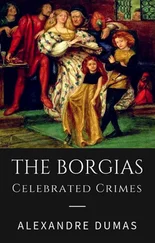Little serious resistance was offered to the French troops and their allies in Aversa, Nola, and other towns in the kingdom of Naples. Only Capua, twenty miles north of the capital, put up a fight, and by the middle of July, Cesare was absorbed in a violent and bloody campaign to seize the city for Louis XII. ‘The taking of Capua was due to the treason of an inhabitant of that city, who secretly let in the Duke’s troops and they then killed him,’ reported Burchard. ‘They killed without pity priests, monks and nuns, in churches and convents, and all the women they found: the young girls were seized and cruelly abused; the number of people killed amounted to around 6,000.’ According to an improbable account by Guicciardini, Cesare had the women of the town locked up in a tower and selected the most desirable for himself. What was certain was that this orgy of rape, murder, and looting ended in the entire population of Capua being killed.
On August 4 d’Aubigny entered Naples in triumph, while the ex-king Federigo, who had been crowned by Cesare’s hand just four years before, fled to the island of Ischia. Louis XII was now Duke of Milan and king of Naples, and the dominant power in Italy, thanks to the support of the pope and his son. When Cesare arrived in Naples, d’Aubigny offered him grateful thanks in the name of the French king and a reward of 40,000 ducats for his services as well as the title of Prince of Andria.
Alexander VI, meanwhile, had taken advantage of the French presence in the peninsula to consolidate his own control over the lands and castles that had once belonged to the powerful Colonna family, and on July 27, the day after Capua had been cruelly sacked, set out on a tour of inspection of his new territories. Riding with him were fifty horsemen, as many as one hundred on foot, his household, and many of the cardinals, each accompanied by their own retinue of servants and courtiers. After lunch at Castel Gandolfo, the pope was rowed around Lake Albano, listening to the crowds gathered at the lakeside shouting, ‘Borgia! Borgia!’ and letting off volleys of gunfire.
During his absence, Alexander VI had entrusted the care of the Vatican, and the church, to the capable hands of his daughter, who moved into the papal apartments. ‘The Pope gave her authorization to open letters addressed to himself,’ reported Burchard, and ‘told her that if there were any difficulties she was to take advice from the Cardinal of Lisbon and the other cardinals, whom she was empowered to summon.’ On one occasion, he continued in an unusual display of ribaldry, she did seek the cardinal of Lisbon’s advice: ‘Seeing that the affair was of no importance, the Cardinal said to her, “When the Pope discusses an issue in consistory, the vice-chancellor or, in his absence, another cardinal, writes a record of the solutions proposed and of the cardinals’ votes, so we should have someone here to take notes of our discourse.” Lucrezia replied that she was quite capable of writing herself. The Cardinal then asked, “But where is your pen?” Lucrezia understood the joke [pen was a popular term for penis] and she smiled.’
— CHAPTER 19 — The Duke and the Borgia Girl
‘IF I COULD OVERCOME MY DISTASTE FOR THESE BORGIA UPSTARTS’
LUCREZIA HAD RETURNED to Rome from her self-imposed exile at Nepi in time for Christmas in 1500 and to the news that Alexander VI had started to consider whom she should marry next. She did not want to marry again, she told her father, according to a report sent by the Venetian ambassador, adding that she said ‘my husbands have been very unlucky’ and ‘she left in a rage.’ She was, however, to have little say in the matter.
The pope carefully considered the merits of alliances with various Italian families before deciding on Alfonso d’Este, the eldest son of Ercole I, Duke of Ferrara. The twenty-four-year-old prince was a widower, his wife having died in childbirth three years earlier. The lineage of the Este family was honourable, their possessions enviable. One of the oldest noble dynasties in Italy and undisputed masters of Ferrara and its surrounding territory since 1240, their state was not so large as either Venice or Milan, but it benefited from the lush soils of the Po plain, was well and profitably administered, and Ferrara itself was a lively centre of the arts. It was, moreover, just to the north of Cesare’s duchy of the Romagna, and the alliance, so the pope thought, would benefit both of his beloved children.
The proposal, however, was not at all welcome in Ferrara, where the Borgias were considered socially inferior and morally corrupt. The Este family may have had many skeletons in their own cupboard, and Alfonso was far from being a model of propriety himself. He was said to have but two interests in life; one was the casting of cannons in his own foundry; the other was walking the streets of Ferrara at night, a drawn sword in one hand, his erect penis in the other. His dead wife had also been the subject of scandalous talk; neglected by her husband, she had shared her bed with a young Negro girl with whom she took male parts in the theatricals for which the Ferrarese court was renowned.
Nevertheless, when the offer was made in the spring of 1501, Duke Ercole and his family were horrified, not least at the prospect of an alliance between themselves and the man currently under suspicion of abducting and raping the pretty young bride Dorotea Malatesta. That Cesare was guilty of the crime, despite his protestations of innocence, no one in Ferrara doubted. And Alfonso’s sister, Isabella d’Este, wife of the Marquis of Mantua, had a special interest in the case; the unfortunate Dorotea had been a protégée of her sister-in-law the Duchess of Urbino.
Moreover, Duke Ercole I was currently pursuing the prospect of royal connections, hoping for the niece of Louis XII as a bride for his son. When the pope’s envoy Cardinal Gianbattista Ferrari proposed a union between the Borgias and the Estes, he was haughtily informed by the duke that it would be ‘impossible to countermand the plans already in process of settlement with His Majesty of France: one does not snatch from the consideration of a king plans which it pleases him to consider, as a wilful child might tease a cat by hiding its bowl of milk.’
Undeterred, indeed provoked, by this rebuff, the pope hinted at the consequences that might ensue upon Duke Ercole’s continued refusal of a Borgia marriage, going so far as to suggest through his envoy that the ‘advantage’ of such a marriage would be that Duke Cesare would ‘no longer be a threat to the south of his Excellency’s dominions’ and that Lucrezia would bring to Ferrara a dowry of no less than 200,000 ducats: ‘I strongly urge you,’ the pope’s envoy was instructed to say, ‘to make a bond with His Holiness.’ Alexander VI also made direct overtures to Louis XII, who responded by informing him that nothing would induce him to ‘unravel the skeins of love’ that linked his niece with Alfonso d’Este, who would soon become her husband.
The king, however, needed the help of the Borgias to further his own ambitions in Italy and, somewhat reluctantly, agreed to call a halt to the negotiations for the proposed marriage between Alfonso and his niece, and to press Duke Ercole instead to accept Lucrezia as his new daughter-in-law. And so it was to be.
In a letter to his son-in-law Francesco Gonzaga, the Marquis of Mantua, Duke Ercole explained his change of plan:
We have recently decided, owing to practical considerations, to consent to an alliance between our house and that of his Holiness — in short to the marriage of our eldest son, Alfonso, and the illustrious lady Lucrezia, sister of the illustrious Duke of Romagna and Valence, mainly because we were urged to do so by his Most Christian Majesty [the king of France] and on condition that His Holiness would agree to everything stipulated in the marriage contract. Subsequently His Holiness and ourselves came to an agreement and the Most Christian King persistently urged us to approve the contract.
Читать дальше











